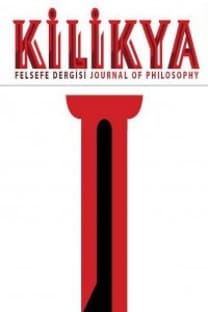NIETZSCHE’DE ARI ÖZNENİN ELEŞTİRİSİ
Kant, “arı usun1 eleştirisi” ile metafiziğe 1) meşru iddialarını teslim etmeyi ve 2) yetkisiz olduğu yerleri göstererek arı usun kullanımındaki gerekli sınırları belirlemeyi amaçlamıştır. Ahlak felsefesinde ise Kant, ahlaki a priori bilgilerin —imkân koşulu olarak da olsa— bulunması gerektiğini öne sürmüştür. Nietzsche ise, farklı bir eleştirel felsefe ortaya koyarak, 1) öznenin ve usunun tamamen ampirik bir zeminde kurulduğunu göstermek suretiyle Kant’ın evrenselleştirdiği formel alt yapıyı olumsallaştırmış ve 2) bir canlı olan öznenin, insan türüne faydalı olabilme potansiyeli bulunan bir bilme yetisinin bulunduğunu öne sürmüştür. Bu makale, Nietzsche’nin Kant’ın eleştirisini perspektivist bir süreç episteme‐ontolojisi ve soykütüksel2 yöntemle nasıl ileri götürüp arı öznenin eleştirisi haline getirdiğini göstermeyi amaçlamaktadır.
NIETZSCHE’S CRITIQUE OF PURE SUBJECT
Kant, with his project of “the critique of pure reason,” aimed at 1) deciding where metaphysics has legitimate claims, and 2) showing where metaphysics has groundless pretensions and setting necessary limits to pure reason thereupon. In his moral philosophy, Kant claimed that —albeit as a condition of possibility— there must be moral a priori knowledge in our reason. On the other hand, Nietzsche, performing a different critical philosophy, 1) made contingent the formal structure which Kant had universalized by showing that subject —and its reason— is constructed on an empirical ground, and 2) claimed that, subject, who is a living being, has an intellect which is capable of producing knowledge potentially beneficial for itself or the human species. This article aims to show how Nietzsche took Kant’s critique a step forward via his perspectivist process episteme‐ontology and his genealogical method; and how he transformed the critique into “the critique of pure subject.”
___
- Deleuze, G. (1995). Kant’ın Eleştirel Felsefesi: Yetiler Öğretisi (T. Altuğ, Çev.). İstanbul: Payel Yayınları.
- Deleuze, G. (2010). Nietzsche ve Felsefe (F. Taylan, Çev.). İstanbul: Norgunk Yayıncılık.
- Hill, K. (2003). Nietzsche’s Critiques: Kantian Foundations of His Thought. New York: Oxford University Press.
- Kant, I. (1984). Aydınlanma Nedir? (N. Bozkurt, Çev.), Seçilmiş Yazılar içinde (ss. 211‐222). İstanbul: Remzi Yayınevi.
- Kant, I. (2001). Pratik Usun Eleştirisi (İ. Z. Eyuboğlu, Çev.). İstanbul: Say Yayınları.
- Kant, I. (2003). Arı Usun Eleştirisi (A. Yardımlı, Çev.). Ankara: İdea Yayınevi.
- Kant, I. (2009). Ahlak Metafiziğinin Temellendirilmesi (İ. Kuçuradi, Çev.). Ankara: Türkiye Felsefe Kurumu Yayınevi.
- Nietzsche, F. (2010). Güç İstenci (N. Epçeli, Çev.). İstanbul: Say Yayınları.
- Nietzsche, F. (2011). Ahlakın Soykütüğü: Bir Polemik (Z. Alangoya, Çev.). İstanbul: Kabalcı Yayınevi.
- Nietzsche, F. (2014). İnsanca, Pek İnsanca‐1 (M. Tüzel, Çev.). Ankara: Türkiye İş Bankası Kültür Yayınları.
- Nietzsche, F. (2016). İyinin ve Kötünün Ötesinde: Gelecekteki Bir Felsefeye Giriş (M. Tüzel, Çev.). Ankara: Türkiye İş Bankası Kültür Yayınları.
- Richardson, J. (2017). Nietzsche, Transcendental Argument and the Subject. M. Brusotti, H. Siemens, J. Constâncio & T.Bailey (Ed.), Nietzsche’s Engagements with Kant and the Kantian Legacy içinde (ss. 27‐44). New York: Bloomsbury Academic.
- Welshon, R. C. (1999). Perspectivist Ontology and de re Knowledge. B. Babich & R. S. Cohen (Ed.), Nietzsche, Epistemology, and Philosophy of Science: Nietzsche and Sciences II içinde (ss. 39‐ 46). Dodrecht, NL: Kluwer Academic Publishers.
- Zavatta, B. (2017). From Pure Reason to Historical Knowledge: Nietzsche’s (Virtual) Objections to Kant’s First Critique. M. Brusotti, H. Siemens, J. Constâncio & T. Bailey (Ed.), Nietzsche’s Engagements with Kant and the Kantian Legacy içinde (ss. 45‐70). New York: Bloomsbury Academic.
- Zimmerman, R. L. (2015). The Kantianism of Hegel and Nietzsche. New York: The Edwin Mellen Press.
- Yayın Aralığı: Yılda 2 Sayı
- Başlangıç: 2014
- Yayıncı: Eray Yağanak
Sayıdaki Diğer Makaleler
DİL FELSEFESİNDEKİ KLASİK ANLAYIŞA KARŞI SAUSSURE’ÜN ÖRTÜK İTİRAZLARI
AGONİSTİK DEMOKRASİDEKİ KAYIP KAVRAM: BİR ‘MODUS’ OLARAK EGEMEN
KARŞIOLGUSAL ÖNERMELER VE BAĞLAM: BROGAARD VE SALERNO’YA BİR CEVAP
ALASDAIR MACINTYRE’IN ÇAĞDAŞ SORUNLAR KARŞISINDA YENİ ARİSTOTELESÇİLİĞİ
NIETZSCHE’DE ARI ÖZNENİN ELEŞTİRİSİ
BİLGİYİ NASIL TEMSİL EDEBİLİRİZ? BİR ÖRNEK OLARAK SORULAR VE SORGULAYICI MANTIK
